Results for ‘ •Misc. Articles•’
(Montreal Family Herald, Nov. 2)
Annals of Niagara-By William Kirby
F.R.S.C. (Montreal: William Drysdale and Co. 1897. Price 75 cents.)
[Welland Tribune, 18 November 1897]

Mr. William Kirby, a distinguished fellow of the Royal Society of Canada, is so well-known throughout the Dominion by his historical romance of “The Golden Dog,” that needs no words of introduction to the public on the present occasion. From 1640 to 1870 is a large space of time to cover with interesting legends, traditions, and narratives of historical facts, and Mr. Kirby must have labored diligently to procure suitable matter and accurate information for the thirty-six chapters of his book. Niagara is the mother town from which the first settlement of Upper Canada began, and its annals date from the earliest record of the appearance of white men among the Indian tribes whom they found in possession of the district. The origin of the name of Niagara does not seem quite certain. Mr. Kirby thinks that it is the same with the Iroquois word for “tobacco smoke.” He notes also that within a century and a quarter the accentuation of the name has been changed. The accent is now on the antepenultimate syllable, but in Goldsmith’s poem of “The Traveller,” 1764, we find: “Where wild Oswego spreads his swamps around, And Niagara stuns with thundering sound.”
Niagara with the accent on the penult, is a grand and sonorous name, but with the accent on the second syllable it sounds mean, and has driven poor Thomas Moore, in the fifth letter of his “Fudge Family in Paris,” to most desperate straits. He tells of unhappy young lovers who thus, side by side,
“Were taking, instead of rope, pistol or dagger,
Desperate dash down the Falls of Niagara.”
The volume is literally filled with good things, and contains something on every page to enlighten or entertain the Canadian reader. We may notice by the way that Moore, whose risky rhyme we just quoted, visited Niagara in the summer of 1804, and received a hearty welcome from Colonel Brock and the officers of the 49th, as well as from the best society in the town. Mr. Kirby also mentions that he heard Thomas Darcy McGee lecture on Moore, in the court house of Niagara, a year or two before his assassination at Ottawa. We can heartily recommend our readers to purchase the “Annals of Niagara,” as we are persuaded that it is a valuable and conscientiously composed monograph.
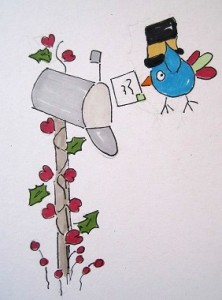
Not sure where this poem originated but we thought it wonderful for the Christmas Season.
Artwork by B-“Airmail”
I have a list of folks I know, all written in a book,
And every year at Christmas I go and take a look.
And that is when I realize that these names are a part,
Not of the book they’re written in but of my very heart.
For each one stands for someone who has crossed my path some time,
And in that meeting they’ve become the “Rhythm of the Rhyme”.
And while it sounds fantastic for me to make this claim,
I really feel I am composed of each remembered name.
And while you may not be aware of any special link,
Just meeting you has shaped my life more than you can think.
For once you’ve met somebody, the years cannot erase
The memory of a pleasant word or of a friendly face.
So never think my Christmas cards are just a mere routine
Of names upon a Christmas list forgotten in between.
For when I send a Christmas card that is addressed to you
It’s because you’re on that list of folks I’m indebted to.
For I am but a total of the many folks I’ve met,
And you happen to be one of those I prefer not to forget.
And whether I have known you for many years or few
In some way you’ve had a part in shaping things I do.
And every year when Christmas comes I realize anew
The BIGGEST GIFTS that life can give is MEETING FOLKS LIKE YOU.
And may the Spirit of Christmas that forever and ever endures,
Leave its richest blessings in the heart of you and yours.
When Ron was a lad delivering newspapers and magazines in his birth city of Welland, Ontario, Canada, his route took him daily past the city library. It became a favorite stop for him and he never left without borrowing another book. He was soon reading topics above his grade level and discussing them with a supportive teacher. Ron never lost that excitement that came from a good story. At 13, he was awarded an I.O.D.E bursary for a tie of the highest graduating mark in grade 8, (Middle School).
newspapers and magazines in his birth city of Welland, Ontario, Canada, his route took him daily past the city library. It became a favorite stop for him and he never left without borrowing another book. He was soon reading topics above his grade level and discussing them with a supportive teacher. Ron never lost that excitement that came from a good story. At 13, he was awarded an I.O.D.E bursary for a tie of the highest graduating mark in grade 8, (Middle School).
Through jobs during school years of unloading lumber from a rail road box cars, and selling shoes he was usually in a world of older people and their stories. Ron’s working life was eclectic. Ron has worked in such jobs as, Steelworker, Machinist, Human Resources, Health and Safety.
A Past President of a service club, The Welland Kinsmen, that raised funds to build a school for ‘developmental disabled students’, and a member of several N.GA., like the Society of Safety Engineers. Ron retired early and then operated a successful Employers Advocacy Consulting business, which entailed writing case arguments to government agencies for employers.
Ron had always dabbled in writing anecdotal short stories and had written dozens of poems, many of which were whimsy. Flirting with writing a book, he’d never found ‘the’ story.
One morning at breakfast he mentioned to his wife a Southern Belle, that he’d had a dream about their grandson finding a young dragon in a dungeon cell. Her response was the three words too seldom exchanged by older married couple. “Write it down.”
And now Ron has.
A PAGE IN TIME
Richard William Kalbe
If time were a book
with pages to turn
I’d flip them back
to a time I yearn.
To a time in that book
that once held you
Hair of golden iridescence
eyes, crystalline blue.
Yet time has allowed
those pages to turn
From that page in time
that I still yearn.
Where once the ink
lay freshly applied
It’s now but parchment
faded and dried.
|
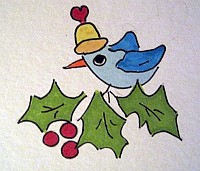 Fall, magic snow, in great white flakes, and still;
Fall, magic snow, in great white flakes, and still;
Mantle old Mother Earth in radiant white;
Cover the sweeping plains, the valleys fill,
Crown all the hill-tops with a hazy light,
This winter’s night.
Fall, kindly words, in great heart-whispers fall;
Mantle the aching hearts, lest they increase;
Cover the wounded souls, the friendless call,
Crown all the restless with a wreath of peace,
Ere kind words cease.
James A. Ross. 1920.
[Welland Tribune, 29 September 1897]
Glorious autumn days have come,
Summer smiles are gone;
The woods are robed in varied hues,
The birds have southward flown.
Because our clime is too severe,
Therefore they hie away;
But ere they go, their sweetest notes
Gladden our autumn day.
The flowers too, died long ago;
Their fragrance we miss so oft,
But we hope next spring will bring then forth,
With their beauty, rare and soft.
New autumn joys will soon be past,
The winter will soon be here,
And we must a supply of food lay by
To keep us in good cheer.
The same as the busy little squirrel
Who gathers for winter’s food
His store of delicious hickory nuts
To feed his little brood.
So let us then improve our time,
Through every autumn day,
And thus prepare for wintry blasts,
While everything is gay.
[Welland Tribune, 24 September 1897]
Contributed by Grace E. Robinson, fourteen years old daughter of John Robinson, Niagara Falls, Ont., and published in the “Home Queen,” Philadelphia.
STORY OF A MOSQUITO
There once lived a mosquito,
He was an insect small
He was very light and airy,
And possessed a lot of gall.
He was known as a deep drinker,
And deeper biter, too,
And you’d feel a little itching
When he’d finished up on you.
But all men ignored his genius,
And although it was absurd,
They resented all his efforts,
And he really felt injured.
But he said, “I’ll gain my purpose,”
And he bit me on the neck,
And I felt and said I’d like to
Break his naughty little back..
At this he thought he’d better
Beat a pretty swift retreat,
And accordingly he stretched his wings
And soon dislodged his feet.
Bit I caught him while escaping,
(What I did you may surmise),
They buried him at 2 p.m.,
In a Fairview grave he lies.
[Welland Tribune 6 August 1897]
If you strike a thorn or rose,
Keep a goin’.
If it hails or if it snows,
Keep a goin’.
Tain’t no use to set an whine
When the fish ain’t on your line,
Bait your hook and keep on tryin,’
Keep a goin’.
When the weather kills your crops,
Keep a goin’
When you tumble from the top,
Keep a goin’
S’pose your out’ o’ every dime,
Gettin’ broke ain’t any crime;
Tell the world your feelin’ prime.
Keep a goin’.
When it looks like all is up,
Keep a goin’.
Drain the sweetness from your cup,
Keep a goin’
See the wild birds on the wing,
Hear the bells that sweetly sing,
When you feel like sighin’ sing,
Keep a goin’.
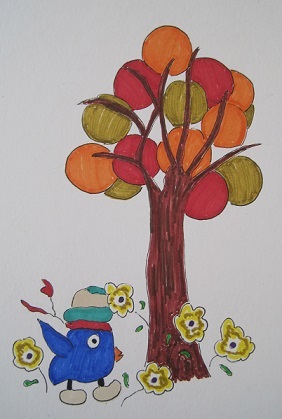 The pumpkin’s lookin’ yellow,
The pumpkin’s lookin’ yellow,
And the buckwheat’s in the shock,
The blackbirds float across the sky
An hundred in a flock;
The clover fields are turnin’ gray,
The trees seem brown and sere,
The summertime is dyin’
And the winter’s creepin’ near;
Across the sea our soldier boys
Are fightin’ brave and bold–
I’m prayin God will shield them from the cold.
The black squirrel’s skippin’ round the tree,
And storin’ up his food,
The sky is lookin’ checkered
And reflects a stormy mood;
The muskrat’s buildin’ high and dry,
A thick-walled winter nest,
And the sun is droppin’ early
‘Neath the snowclouds of the west;
And over there our bravest boys
Are winnin what they’ll hold–
I’m prayin God will shield them from the cold.
The coon is stealin’ all the corn
To fill his hollow log,
The wild goose honks across the sky,
Before the frosty fog;
A snowflake’s fallin here and there,
The wind is blowin chill,
And the angry winter’s comin’
To frost the plain and hill;
The Pride of Canada is there,
The white sheep of the fold–
I’m prayin’ God will shield them from the cold.
Canada First and other poems by James A. Ross, 1920.


 Subscribe..
Subscribe..
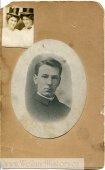

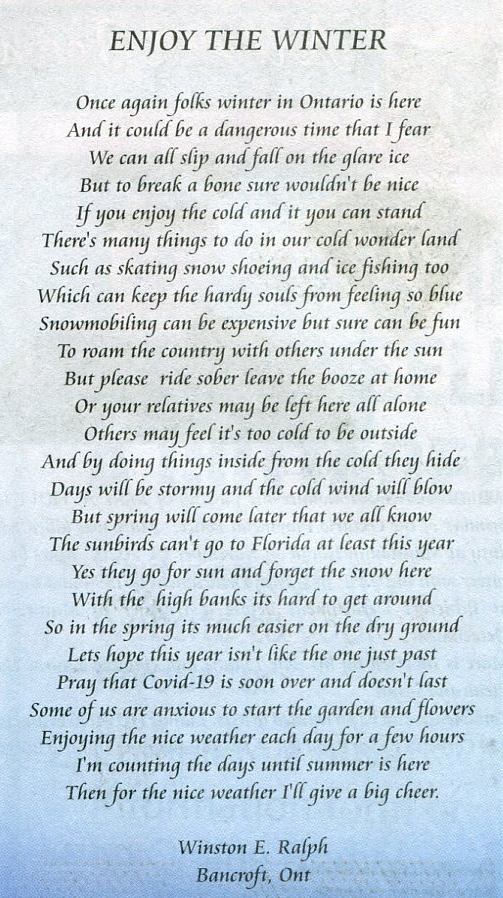


 Fall, magic snow, in great white flakes, and still;
Fall, magic snow, in great white flakes, and still; The pumpkin’s lookin’ yellow,
The pumpkin’s lookin’ yellow,